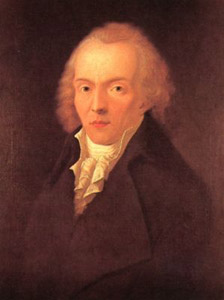Happy 250th, JP!

This morning’s riddle, dear bloggiste: Who is the famous German writer from the days of Goethe and Schiller, known by his French first name, if known at all, and who was born today 250 years ago?
Well, give your tongue to the cat, as the French would say? He is known as “Jean Paul” & his full name is Jean Paul Friedrich Richter (21 March 1763 – 14 November 1825).
Little is in English, or at least available today, though in the 19C much was translated. On the other hand, if you have German you can download free kindle editions for some of the core works: Flegeljahre, Vorschule der Ästhetik, Siebenkäs, & many others. An at times wonderfully weird — in an odd scurrilous country manner that however links to experimental writing 100 years later — he is also a writer “close to nature” as they say, and someone like Paul Celan was a serious reader of Richter, with, it would seem from his reading notes, a preference for Das Kampaner Thal which he mined for its vocabulary.
Here is the commentary Jerome Rothenberg & Jeffrey Robinson added to their selection from Jean Paul’s work in Poems for the Millennium 3, following a Jean Paul text titled: FIRST FLOWER PIECE — Speech of the Dead Christ from the Top of the Universe: That There is No God:
COMMENTARY
The whole spiritual Universe is dashed asunder by the hand of Atheism into numberless quicksilver points of Me’s, which glitter, run, waver, fly together or asunder, without unity or continuance. J. P., Preamble to “First Flower-Piece”
(i) But what remains most fixed in mind is the paraphrase by Nerval of Jean Paul’s nightmare line: “god is dead! the sky is empty / weep, children, you no longer have a father” (page 488). Given momentum by Jean Paul’s translators—Stael in France, Carlyle in England—it comes at us most forcefully through Nietzsche and for a while becomes a shaping proposition for twentieth-century thought & (dis)belief, a major inheritance from an earlier romanticism. As such the dream presented here was from a work that he called “flower-, fruit & thorn-pieces” (1796-97) & would be better read in the context of Jean Paul’s total oeuvre. In that light he emerges as a master of a “romantic irony” that pushes inexorably toward the surrealist “black humor” enunciated by Andre Breton (1948) & practiced by Kafka & Beckett, among others. Linked to Sterne & Voltaire among his predecessors—even more to Shakespeare, as in the first version of the present work that he titled “Lament of the Dead Shakespeare”—his contribution puts the “humoristic / comic/ absurd alongside the ethereal / ephemeral / infinite at the heart of the romantic project. In the German original, Jean Paul’s stance is expressed in a language narked by “quirky vocabulary, wayward syntax, . [and] endless metaphors” that makes him, writes Timothy Casey, “the most taxing of German writers.” It is to be remembered, too, that “Speech of the Dead Christ,” like nuch of his work, is a great dream narrative in which Jean Paul’s “I” echoes that of the Dead Christ, & that he later forces himself into awakening from what appears as the nightmare of an empty/emptied universe.
2) “By our definition romantic poetry, as opposed to plastic poetry, delights in presenting the infinity of the subject in which the object-world loses its limits as in a kind of moonlight. But how will the comic become romantic, since it consists merely in contrasting the finite with the finite and cannot allow any infinity? If Friedrich [von] Schlegel is right in maintaining that the romantic is not a species of poetry, but that poetry must always be romantic [page 901], then the same is even more true of he comic; all comic poetry must become romantic, i.e., humoristic” (Jean Paul, “On Humoristic Poetry,” in School for Aesthetics, 1804).
And Novalis in acknowledgment: “Jean Paul could possibly be called a humoristic epic poet. He is also an (instinctively) natural, encyclopaedic humorist.”

 “Interglacial Narrows (Poems 1915-2021)” Contra Mundum Press
“Interglacial Narrows (Poems 1915-2021)” Contra Mundum Press “Always the Many, Never the One: Conversations In-between, with Florent Toniello” Contra Mundum Press
“Always the Many, Never the One: Conversations In-between, with Florent Toniello” Contra Mundum Press “Conversations in the Pyrenees”
“Conversations in the Pyrenees” “A Voice Full of Cities: The Collected Essays of Robert Kelly.” Edited by Pierre Joris & Peter Cockelbergh
“A Voice Full of Cities: The Collected Essays of Robert Kelly.” Edited by Pierre Joris & Peter Cockelbergh “An American Suite” (Poems) —Inpatient Press
“An American Suite” (Poems) —Inpatient Press “Arabia (not so) Deserta” : Essays on Maghrebi & Mashreqi Writing & Culture
“Arabia (not so) Deserta” : Essays on Maghrebi & Mashreqi Writing & Culture “Barzakh” (Poems 2000-2012)
“Barzakh” (Poems 2000-2012) “Fox-trails, -tales & -trots”
“Fox-trails, -tales & -trots” “The Agony of I.B.” — A play. Editions PHI & TNL 2016
“The Agony of I.B.” — A play. Editions PHI & TNL 2016 “The Book of U / Le livre des cormorans”
“The Book of U / Le livre des cormorans” “Memory Rose Into Threshold Speech: The Collected Earlier Poetry of Paul Celan”
“Memory Rose Into Threshold Speech: The Collected Earlier Poetry of Paul Celan” “Paul Celan, Microliths They Are, Little Stones”
“Paul Celan, Microliths They Are, Little Stones” “Paul Celan: Breathturn into Timestead-The Collected Later Poetry.” Translated & with commentary by Pierre Joris. Farrar, Straus & Giroux
“Paul Celan: Breathturn into Timestead-The Collected Later Poetry.” Translated & with commentary by Pierre Joris. Farrar, Straus & Giroux